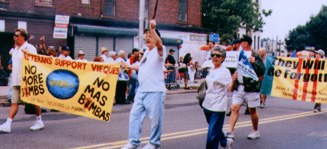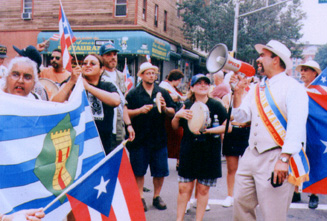 |
U.S. Military Wages War Against Itself And Against The WorldBy Robert Rabin[From a Committee for the Rescue and Development of Vieques mailing, September 2, 2001] During the past two decades in the battle of Vieques, we have had ample opportunity to learn from people throughout Puerto Rico, the United States and other countries, about the effects of militarism on communities. The impact of the expropriations, military toxins, violent actions by military personnel, and economic stagnation in areas like Culebra, Aguadilla, Salinas and Ceiba - to mention a few examples - has much in common with the military presence in Vieques. For years we have shared with residents of these areas our experiences and strategies of struggle. What we did not know, until recently, was the widespread and horrible impact of U.S. militarism within its own national territory and in many countries where the United States maintains military bases. The armed forces of the United States of North America carries out a war against its own people, particularly against Afro-American, Latino, Indigenous and generally poor communities. The plague of militarism extends to U.S. territories like Guam, Hawaii, Alaska and Puerto Rico and is manifest in Japan, Okinawa, the Philippines, Korea, Ecuador, Colombia and Panama, among other places on this planet.
Within U.S. territory - inside and outside the North American continent - a network of bases and installations brings death and destruction to entire communities, through intense military contamination with the same long list of cancer-causing chemicals that we see in the reports from Vieques - heavy metals, nitrites, nitrates, RDX, uranium, among others. Mustard gas bomblets, a chemical weapon used in the second World War, were recently found during a construction project in Colorado. In Memphis, Tennessee, the community fights against the terrible health effects from a military dump. In San Antonio, Texas, the recently-closed Kelly Air Base is considered the root of unusually high cancer rates and other sicknesses related to the long history of contamination generated on that military facility. In Massachusetts, millions of gallons of water in the most important aquifers of an extensive area on Cape Cod have been seriously contaminated with military contaminants from Camp Edwards, where diverse National Guard units have carried out military exercises for more than half a century. In the same state, the Wampanoag Indigenous Nation struggles for the environmental recuperation and tribal control over the island of Tequanomans. Of great spiritual significance, the Navy bombed this island for decades. Families of this indigenous people who live close to Tequanomans Island suffer from the highest cancer rates in that part of the state.
A series of rapes of young girls and other violent acts by U.S. military personnel in Japan, Okinawa, Korea, the Philippines and Panama remind us of the violence against Viequense women by gangs of Marines in the streets of Vieques in the 1950s and 60s. The death of "Mapepe" Christian, an old man in the Destino area of Vieques who was brutally kicked and punched by several soldiers in 1952, is repeated constantly in U.S. military zones on every continent. In Maehyang-ri, Korea, jets rest only on the weekends. Every other day they fly low over the poverty of the rice fields on their way to the impact zones only a few miles from the homes of thousands of Koreans. Manila Bay and the closed bases of Subic and Clark in the the Philippines, where today thousands of people try to remake their lives, have been converted into some of the most contaminated places in Asia - and the U.S. government refuses to take any responsibility for the environmental cleanup. A similar situation exists in Panama, where the military left the Canal Zone, but also left a deadly contamination that includes large amounts of chemical weapons in the Panamanian jungles and uranium dispersed in the ground and air. The diverse struggles of the Hawaiian people for peace and for demilitarization share much in common with those of the people of Vieques. In the 1970s, while our fishermen paralyzed NATO maneuvers and were arrested and jailed, Hawaiians were beginning their struggle to rescue the Island of Kaho'olawe, an uninhabited island with great spiritual and archaeological importance. In the Makua Valley, the guns of the U.S. Army have been silent for some years, but they want to renew practices. The people of Hawaii fight to defend Makua. U.S. militarism has left a trail of contamination, death and violence around the world and has provoked a new wave of international solidarity among people opposed to the destruction of natural resources, to the arrogant and racist military attitudes, to the irresponsibility and air of superiority that permits the most horrendous actions against humanity. The struggle of Vieques is not unique. However, the successful campaign of peaceful civil disobedience and the widespread support generated among sectors of the Puerto Rican and U.S. communities that are usually divided has had important repercussions. The attention we have received in these two years of intense battle, combined with decades of previous struggle, has caused other communities with similar struggles to look toward Vieques, to ask for our help, to learn from our successes and failures. The residents of Maehyang-ri, Korea, have begun to call themselves - THE VIEQUES OF KOREA! We must do the same - learn from the multiple examples of other communities that struggle with great dignity and with greater or less success, against the same enemy and in favor of the same ideal. U.S. Army General James Jones said recently in a Pentagon interview, "I do worry about the effect of being forced to leave Vieques, not only on our domestic training ranges but on international access . . . this is a small world now . . . People on Okinawa watch what happens on Vieques, and they will draw conclusions from that.'' Vieques is Okinawa. Vieques is Makua. Vieques is the Philippines. Vieques is Maehyang-ri. Vieques is the Canal Zone. Vieques is Alaska, Camp Edwards, Memphis, San Antonio, and San Diego. For the children of Vieques, for the children of Hawaii, the Philippines, Okinawa, Memphis, San Antonio, San Diego and Massachusetts, we will continue this struggle to end the dehumanizing structures of militarism, until there is peace on Vieques, until there is peace for all. Comite Pro Rescate Y Desarrollo De Vieques
|


 The Committee for the Rescue and Development of Vieques (CRDV) has important contacts with peace organizations in Puerto Rico, in the United States and internationally, that help us see our situation in a broader context. The participation of delegates from the CRDV in conferences about militarism held in the United States, England, the Philippines, Korea, Japan, Okinawa, Washington (DC), New York, San Diego, among other places, has permitted us to learn first-hand about the efforts of community organizations working to end military activities that violate the human rights of millions of people throughout the world. The CRDV works with the Caribbean Project for Peace and Justice (Puerto Rico), the Military Toxics Project (United States), the International War Resisters League and the Fellowship of Reconciliation (San Francisco), among other peace groups, to spread the word about Vieques and to learn more about how militarism affects other peoples. Vieques is not alone in this battle against the forces of destruction.
The Committee for the Rescue and Development of Vieques (CRDV) has important contacts with peace organizations in Puerto Rico, in the United States and internationally, that help us see our situation in a broader context. The participation of delegates from the CRDV in conferences about militarism held in the United States, England, the Philippines, Korea, Japan, Okinawa, Washington (DC), New York, San Diego, among other places, has permitted us to learn first-hand about the efforts of community organizations working to end military activities that violate the human rights of millions of people throughout the world. The CRDV works with the Caribbean Project for Peace and Justice (Puerto Rico), the Military Toxics Project (United States), the International War Resisters League and the Fellowship of Reconciliation (San Francisco), among other peace groups, to spread the word about Vieques and to learn more about how militarism affects other peoples. Vieques is not alone in this battle against the forces of destruction. In Alaska, radar stations abandoned at the end of the Cold War, with the cessation of spying operations directed at Russia, have left an enormous amount of toxins in the ground, in the waters and in the food chain of thousands of indigenous peoples of that region. In San Diego, California, large numbers of poor, Afro-American, Latino, Indigenous, Asiatic communities suffer the consequences of long years of contamination caused by military shipyards and the contamination from nuclear wastes from submarines and aircraft carriers stationed in that city's waters. Military practices relatively close to Washington, DC, at the Aberdeen Proving Grounds in Maryland, have forced neighboring communities to take action to stop military toxins - including depleted uranium - from migrating to their backyards.
In Alaska, radar stations abandoned at the end of the Cold War, with the cessation of spying operations directed at Russia, have left an enormous amount of toxins in the ground, in the waters and in the food chain of thousands of indigenous peoples of that region. In San Diego, California, large numbers of poor, Afro-American, Latino, Indigenous, Asiatic communities suffer the consequences of long years of contamination caused by military shipyards and the contamination from nuclear wastes from submarines and aircraft carriers stationed in that city's waters. Military practices relatively close to Washington, DC, at the Aberdeen Proving Grounds in Maryland, have forced neighboring communities to take action to stop military toxins - including depleted uranium - from migrating to their backyards.